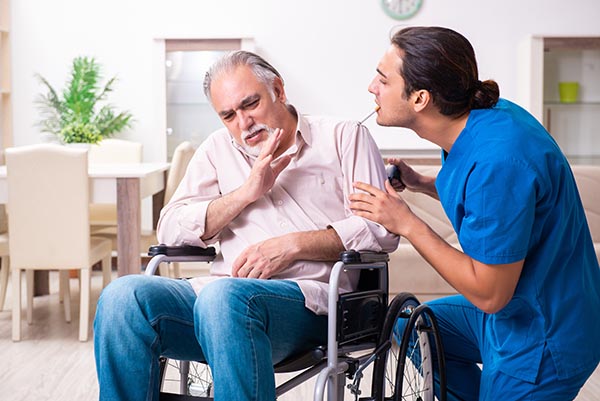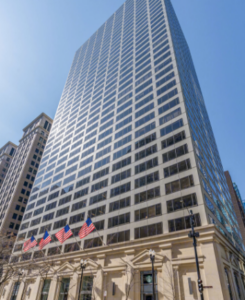Best Nursing Home Abuse Lawyers

Best Nursing Home Abuse Lawyers
Helping a loved one transition to a nursing home or assisted living facility can be a highly emotional process. What often helps is knowing that they will be properly cared for and have all of their basic needs met.
When these institutions fail to adequately care for a resident or hire a dangerous employee, senior citizens can suffer serious or even fatal injuries as well as emotional harm. In these cases, don’t delay in seeking the aid of the best nursing home abuse lawyer in Chicago and beyond: Dr. Susan E. Loggans.
Retain a Nursing Home Abuse Attorney
If you or a loved one has been the victim of any nursing home negligence, it’s important to hold the institution accountable immediately.
Fighting to protect the rights of one resident helps ensure the safety and well-being of all residents.
Call (312) 201-8600 or visit our contact page to schedule your free, no-obligation consultation with our nursing home abuse lawyers. We represent clients on a contingency-fee basis—meaning you pay nothing unless you win.
Overview of Nursing Home Neglect Attorneys
Types of Nursing Home Abuse
Warning Signs of Nursing Home Abuse
FAQs
What to Do If You Suspect Nursing Home Abuse
Find the Best Nursing Home Abuse LawyerSusan Loggans Law
Types of Nursing Home Abuse
Elder abuse refers to any actions that cause physical harm or mental distress to senior citizens. It can take on many forms in a nursing home or assisted living setting, including physical abuse, sexual abuse, psychological and emotional abuse, and financial abuse.
The Illinois Department of Public Health (IDPH) is responsible for ensuring nursing homes comply fully with mandatory state regulations under the Nursing Home Care Act.
Facilities in the State of Illinois are also subject to federal regulatory requirements set forth by the U.S. Department of Health and Human Services’ Centers for Medicare and Medicaid Services (CMS).

Violations are classified as follows under the Illinois Nursing Home Care Act:
Type “AA” Violation (210 Illinois Compiled Statute 45/1-128.5)
This includes any incident or condition that has caused—or nearly caused—the death of a resident. Any licensee who commits a Type “AA” violation is automatically issued a conditional license for a period of six months to coincide with an acceptable plan of correction and assessed a fine up to $25,000 per violation.
Type “A” Violation (210 Illinois Compiled Statute 45/1-129)
This includes any incident that has led or could lead to physical harm and a high probability of death or mental or physical harm. Any licensee who commits a Type “A” violation is automatically issued a conditional license for a period of six months to coincide with an acceptable plan of correction and assessed a fine of up to $12,500 per violation.
Type “B” Violation (210 Illinois Compiled Statute 45/1-130)
A violation of this Act includes any incident that would likely cause mental or physical harm. A licensee committing a Type “B” violation is assessed a fine of up to $1,100 per violation.
Type “C” Violation (210 Illinois Compiled Statute 45/1-132)
These violations include less serious incidents that may not cause immediate mental or physical harm, but have a high probability of causing such harm in the future. A licensee who commits 10 or more Type “C” violations in a single survey period is assessed a fine of up to $250 per violation. A licensee who commits one or more Type “C” violations with a high risk designation is assessed a fine of up to $500 per violation.
Warning Signs of Nursing Home Abuse
Some of the most common signs of neglect and abuse of elders include, but are not limited to:
- Bedsores (pressure ulcers)
- Burn injuries
- Wrongful death
- Changes to will or power of attorney
- Broken bones
- Malnutrition and weight loss
- Medication errors
- Sepsis
- Sudden financial problems
- Unexplained falls or other unexplained injuries
- Emotional distress
- Poor hygiene
Frequently Asked Questions
How do I know if I have a nursing home negligence case?
If you suspect that you or a loved one is the victim of elder abuse, it’s important to take legal action immediately. Nursing home abuse is an often underreported crime. An experienced personal injury attorney can help you make the strongest case possible to ensure the safety of all residents under the facility’s care.
What is the statute of limitations for filing an elder abuse claim?
Illinois civil statute of limitations laws impose a two-year time limit for personal injuries, which most elder abuse claims would fall under, though there may be additional factors involved that allow for other courses of action.
It is important to keep in mind the implications of elder abuse on all other residents of the facility in question. If you suspect you or a loved one is a victim of elder abuse in a nursing home or assisted living facility, we highly recommend you seek legal counsel immediately for the protection of all parties involved.
What damages are awarded in abusive or negligent nursing home cases?
Damages that may be awarded to nursing home residents and their family members in nursing home abuse cases include:
- Punitive damages
- Pain and suffering
- Medical expenses
- Mental health treatment
How successful are nursing home lawsuits?
These lawsuits tend to have a high success rate, with one study claiming up to an 88% success rate in nursing home abuse lawsuits.
What are the causes of elder abuse in nursing homes?
Common causes of elder abuse in long-term care facilities include:
- Understaffing
- Undertrained staff
- Caregiver burnout
- No oversight or accountability measures
- Mental health and substance abuse issues from nursing home staff members
- Lack of knowledge on the warning signs or a resident’s rights
- Mental decline and cognitive impairment among residents
What evidence is needed for a successful nursing home lawsuit?
Most successful suits against nursing homes require the following evidence:
- Medical records
- Photo and/or video evidence
- Witness testimony
- Incident reports
- Financial records
How do I protect my loved one from nursing home abuse?
Some of the best ways to protect your loved one from mistreatment at a residential senior care facility include the following:
- Knowing the warning signs of nursing home injuries and neglect
- Studying up on elder care laws and senior’s legal rights
- Knowing your legal options
- Documenting any serious injury or other noticeable changes
- Making sure the nursing facility you choose has proper staffing
How do I report nursing home abuse?
Places to report cases of nursing home abuse and neglect that occurred in Illinois include:
- U.S. Department of Justice’s portal to report suspected elder abuse
- The regional ombudsman
- Illinois Senior Helpline
- Illinois Department of Public Health’s Office of Healthcare Regulation portal
- Illinois Department of Public Health’s Nursing Home Hotline (1-800-252-4343)
How do I find a nursing home neglect lawyer?
When you need a nursing home abuse lawyer, you deserve the best.
Susan E. Loggans & Associates is an experienced law firm with decades of experiencing fighting for seniors and their families, winning cases of medical malpractice, sexual assault, neglect, and other types of elder abuse.
What to Do If You Suspect Nursing Home Abuse
Victims of nursing home abuse and their loved ones are advised to do the following to build a strong case:
- Collect evidence of the mistreatment or neglect.
- Get all medical records relevant to the abuse or neglect case.
- Document any financial burdens related to the nursing home abuse and neglect.
- Seek the help of an experienced law firm.
- Not delay in contacting an attorney to avoid statute of limitations issues.

Find the Best Nursing Home Abuse Lawyer with Susan E. Loggans & Associates
Senior citizens are one of our most vulnerable populations. They need and deserve a powerful advocate, for both their own safety and the safety of other residents.
Susan E. Loggans & Associates has a strong reputation for protecting those living in nursing homes and assisted living facilities.
If you or a loved one has been the victim of elder abuse, contact our office immediately to discuss your options and lawful rights to compensation. Call (312) 201-8600 or visit our contact page to schedule a free, no-obligation consultation with our experts in elder abuse claims.
